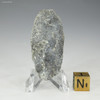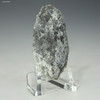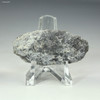Anorthoclase Crystal — Mt Erebus, Ross Island, Antarctica
Brand : Sciencemall-USA
- SKU:
- JPT-118845
- Condition:
- New
- Availability:
- Usually ships in 24 hours.
- Weight:
- 1.00 LBS
- Minimum Purchase:
- 1 unit
- Maximum Purchase:
- 1 unit
- Gift wrapping:
- Options available
- Shipping:
- Calculated at Checkout
Mount Erebus Anorthoclase Crystal – Classic “Erebus Feldspar”
This ultra-rare anorthoclase feldspar crystal came from the slopes of Mount Erebus, Ross Island, Antarctica — the southernmost active volcano on Earth. Its elongated prismatic form, grey-white etched surface, and patches of attached vesicular lava match the classic morphology described by Frank Debenham during Scott’s famous 1910–13 Terra Nova Expedition.
Type Locality: Mount Erebus, Ross Island
Collected from the Erebus Volcanic Province, where loose anorthoclase phenocrysts mantle the crater slopes. These crystals are historically linked to the same field region documented by Debenham during early Antarctic exploration.
Scientific Lineage
The optical and chemical characteristics of Erebus anorthoclase were established by E. D. Mountain (1925, Mineralogical Magazine). His work confirmed that these feldspars are Na–K alkali feldspar with an approximate specific gravity of 2.62 and 2V ≈ 62°.
Literature Reference
Mountain, E. D. (1925). “Potash-oligoclase from Mt. Erebus, Antarctica, and anorthoclase from Mt. Kenya, East Africa.” Mineralogical Magazine, 20, 331–345.
Diagnostic Features of This Specimen:
Crystal Habit
Elongate, thick-prismatic crystal with tapered ends—entirely consistent with classic Erebus feldspar phenocrysts.
Surface Texture
A strongly weathered grey-white, naturally etched surface produced by long-term exposure and abrasion within phonolitic ejecta on the crater slopes.
Adhering Lava
Dark, vesicular lava patches (phonolite/kenyte fragments) fused to the crystal surface—a hallmark indicator of the volcano Mount Erebus ejecta.
Fractures & Cleavages
Irregular but directional breaks that align with the two feldspar cleavages near 90°, typical of anorthoclase.
Specimen Details:
- Size: 48 mm L × 24 mm W × 10 mm D
- Locality: Mount Erebus, Ross Island, Antarctica
- Collection History: Legally collected prior to the 1970s; from an old scientific estate collection.
Included With Purchase
- Certificate of Authenticity
- Specimen tag
- Tag stand
- Information sheet on the locality and mineralogy
- COPY of the 1925 scientific article: Potash-oligoclase from Mt. Erebus, Antarctica, and Anorthoclase from Mt. Kenya, East Africa by E. D. Mountain
Collector's Value
Mount Erebus is the type locality for unusually large and distinctive anorthoclase crystals. This specimen bridges the heroic-era Antarctic expeditions and the modern scientific understanding of alkaline volcanism. Its fusion of historic provenance, mineralogical importance, and polar exploration lineage makes it an outstanding centerpiece for any advanced mineral or “mini-museum” collection.
Add to Your Collection
A rare, historically anchored Antarctic anorthoclase crystal from one of the southernmost iconic volcanic sites on Earth—ready to become the highlight in any elite geological collection. Only 1 available.













